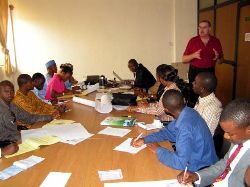
Regional Environmental Hubs
To address transboundary environmental issues, and to support officers working on OES issues, the Department established 12 regional environmental Hubs, located in embassies around the world. The Hub concept is based on the idea that transboundary environmental problems can best be addressed through regional cooperation. The regional environmental officer's role complements the traditional bilateral Environment, Science, Technology and Health officers stationed in U.S. embassies in many countries of the world. Rather than dealing with a single country, Hub officers engage with several countries of a region on a particular issue, with the aim of promoting regional environmental cooperation, sharing of environmental data, and adoption of environmentally sound policies that will benefit all countries in that area.
Like the bilateral officers, the Hubs work closely with other USG agencies and support their efforts by raising key issues at the diplomatic level. They cooperate extensively with non-governmental organizations, and regional organizations on environmental activities within their region.
|
|
|
 |
The U.S. Trains 64 Nigerian Environmental Officers on Oil Spill Detection and Recovery Techniques and MethodsU.S. Environmental Protection Agency Specialist and 2009 Science Fellow Michael Solecki is in Nigeria for 12 weeks providing technical assistance and training for several Nigerian organizations. Under the program, twenty one mid-level environmental officers from the National Oil Spill Detention and Response Agency (NOSDRA) and the Pipeline Product Marketing Company (PPMC) have received three-weeks of training on oil spill detection and clean-up and restoration of affected areas. Click here for more information. |
|
|
|
 |
Mission Environmental Awareness Activities Target Youth in IndonEsiaU.S. Embassy Jakarta hosted an event for local schoolchildren to promote educational activities to increase environmental awareness and stewardship. Schoolchildren participated in the creation of panel depicting Indonesian wildlife and farming scenes. Post later compiled those images into a calendar (shown) that has been shared at additional environment-themed outreach events and with Indonesian environmental NGOs and schools. Click here for more information on U.S. support for Forest Conservation in Asia. |